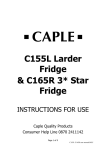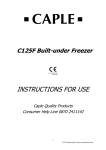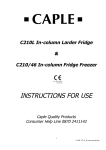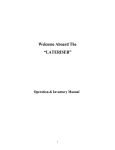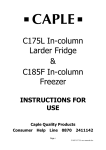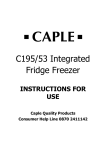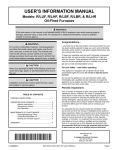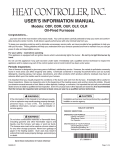Download Caple use and maintenance Instruction manual
Transcript
Instructions for use and maintenance RBR1A Read this booklet carefully and follow all the instructions in it BA ☞ SAFETY WARNINGS ENGLISH This section details the main safety warnings. Read it carefully before installing and using the equipment. - Always keep the instruction manual and, if you sell the equipment, hand it over to the new owner. - This equipment must not be installed outdoors, not even under the cover of roofing; it is extremely dangerous to expose it to rain, storms and bad weather in general. - We recommend waiting at least an hour before connecting up the appliance in order to allow the cooling oil circuit to reach full efficiency. - The equipment must be used exclusively for domestic preservation and/or freezing of food. - Packaging materials such as plastic bags, polystyrene, plastic tape must be kept out of reach of children as they are potential sources of danger. - Do not allow children to play with the equipment, eg. sitting in the baskets or swinging on the door. The fridge could tip over or objects on top might fall off. - Do not use the mouldings, baskets, doors or grids to stand or lean on. - Be careful not to damage the cooling fluid circuit during positioning, installation or cleaning. - Having installed the equipment make sure it’s not resting on the power cable. - It is not advisable to use extensions or multiple plugs for connecting to the power supply. - Never touch the appliance or operate it with bare feet or wet hands or feet. - Before carrying out any cleaning or maintenance operations, disconnect the equipment at the power outlet or switch off your entire power system. - Each grid or basket can take a maximum distributed load of 18 kg. - To disconnect the equipment from the mains supply, remove the plug but don’t do this by pulling the cable. - Don’t put glass bottles or other containers in the freezer compartment as they might crack or break when the contents are frozen. - Avoid flames or sparks inside the equipment. - Do not consume food of which the storage deadline has expired, as this may cause food poisoning. - Do not obstruct the equipment’s ventilation openings/grills. - During defrosting, never use metallic objects to accelerate the process. Failure to observe this rule could cause irreparable damage to the cooling fluid circuit. - Don’t use electrical appliances (ice-cream makers, deodorizers, etc.) inside the equipment. Any maintenance, including replacement of the power cable, must be done by the technical assistance service or other qualified personnel. To ignore this rule is to run a very dangerous risk. This equipment is made for use in contact with foods and complies with D.L. 108, 25.01.92 (EEC Directive 89/109). This equipment is designed, built and sold in accordance with: - EC EC EC EC Directive Directive Directive Directive 73/23 89/336 93/68 96/57 - LOW VOLTAGE EMC EC markings energy efficiency R ENVIRONMENTAL INFORMATION This equipment was manufactured with the maximum respect for the environment. To guarantee the same scrupulosity when it’s disposed of (given the presence of pollutant or inflammable materials, eg. lubricant in the compressor), never abandon the equipment outside. Contact the local authority responsible for collection and disposal. Don’t throw the packaging material from your equipment in the rubbish but sort the various materials (eg. polystyrene, cardboard, plastic bags) as required by local waste disposal authorities in pursuance of current legislation. This equipment does not contain CFCs (the cooling circuit contains R134a) or HFCs (the cooling circuit contains R600a - ISOBUTANE). To check which gas is used, see at the technical data plate on the equipment. 3 For equipment with ISOBUTANE (R600a) Isobutane is a natural gas that doesn't affect the environment, but it is inflammable. It is therefore indispensable to check that the cooling circuit tubing is not damaged before connecting the equipment to the mains. - For every 8 g of cooling fluid, the installation location must have a minimum volume of 1 cubic metre. The amount of cooling fluid in the appliance is indicated on the technical data plate inside the refrigerator. - Leakage of cooling fluid: avoid naked flames or other sources of ignition at the seat of the leakage. A INSTALLATION In order to avoid damage to persons or property, the equipment should be installed by two persons. In the event of damage to the equipment during transport, immediately inform the supplier before proceeding to installation. The equipment must be placed in a dry, well ventilated position. The equipment must be installed on a flat, stable surface, using the adjustable feet if necessary and following the instructions provided inside the product. In fitting the equipment inside the unit make sure you don't squash the power cable. Air inflow to and outflow from the equipment must be ensured by means of an aperture in the skirting board and a vertical slit in the rear of the unit. Minimum transverse section of aperture in skirting board and slit: 250 cm2. Ambient temperature has a considerable influence on energy consumption, so the equipment should not be exposed to direct sunlight or placed by heat sources such as radiators, heaters, cookers, etc. If necessary install insulation panelling against the sides of the unit. Check the climate classification on the technical data plate inside the equipment, on the left hand side. "SN" (operates "N" (operates "ST" (operates "T" (operates at at at at ambient ambient ambient ambient temperatures temperatures temperatures temperatures between) between) between) between) +10° +16° +16° +18° C C C C and and and and +32° +32° +38° +43° C C C C Warning! It is important to ensure access to the equipment's power outlet in the wall, so that the plug can be removed if necessary. If this isn't possible, connect the equipment to the mains via a double pole switch with a contact opening distance of at least 3 mm in an accessible position. ELECTRICAL CONNECTION Connection of the equipment to a power outlet with an earth contact is required by law. For this reason the equipment is provided with a plug with an earth wire to fit in an outlet of the same type. The manufacturer declines any liability for damage to persons or property due to failure to observe this rule. Check that the voltage indicated on the technical data plate inside the fridge on the left hand side is the same as that of your mains supply. Instructions for replacing internal light: Disconnect the plug or switch off the main supply switch before changing the light. the new lamp must be of the same wattage as the value indicated on the lamp shield (eg. max. 15 W). 4 B GETTING TO KNOW YOUR REFRIGERATOR The refrigerator you've chosen allows you keep frozen food and freeze fresh food and if it has a freezer compartment (depending on the model) you can also keep frozen food and freeze fresh food (see section on freezing). Temperature regulation The temperature can be regulated in steps by means of the thermostat. Position 0 means equipment operation suspended (off internal light not working) Position 1 means equipment operation at minimum Position 7 means equipment operation at maximum Remember that thermostat settings are affected by variations in the ratio to the ambient temperature, the quantity of food in the fridge, the position the fridge is in and how often you open the fridge door. Experience will tell you which setting is right for your needs. To move or remove the shelves, raise the rear part, pull forward till the front part leaves the guides, pull upwards and remove completely. Choose a new position and put the shelf back in by reversing the procedure. PRESERVING FOOD The temperature varies from place to place inside the fridge. The coldest parts are immediately over the fruit and vegetable baskets, near the rear wall. In the freezer compartment (-18° C) you can keep frozen food for months. We advise a thermostat setting on positions 4÷5. The storage deadline for frozen foods is usually written on the packet. A product that starts to defrost must under no circumstances be re-frozen and must be consumed as soon as possible. To preserve flavours, consistency and freshness we suggest wrapping the food in aluminium or cling foil and placing it in containers with a lid. IMPORTANT: do not put glass containers with liquid in them in the freezer or warm food in the fridge compartment. Foods which easily absorb smells and flavours and liquids and products which are very alcoholic must be kept hermetically sealed in an upright position. Making ice cubes Three-quarters fill the ice cube trays with water and place in the freezer. If, when freezing, the trays stick to the surface of the freezer, don't use a sharp or pointed object to remove them, which might damage the equipment. Use the handle of a spoon. WARNING: don't eat ice cubes or ice-blues straight from the freezer, as this may cause ice burns. B TIPS ON FREEZING - Prevent products to be frozen coming into contact with products that are already frozen. Make sure packets are dry, as this will prevent a number of packets from freezing into a solid block. - Always prepare food in individual portions for faster freezing. - To freeze the maximum quantity of food indicated on the technical data plate, proceed as follows: - Set the thermostat to 45 24 hours before freezing. - Put the food in the freezer compartment in contact with the walls and avoid opening the door unless necessary and even then only very briefly. - 26 hours after the start of freezing put the thermostat back to the desired setting. DEFROSTING If the refrigerator doesn't have a freezer compartment, it defrosts automatically. During defrosting, droplets of water flow down the back wall of the cell. The water is channelled into a container by the compressor and evaporates. If the refrigerator does have a freezer compartment, to limit energy consumption it is advisable to remove excess frost (3/4 mm) from the freezer box at regular intervals. To do this, never use sharp objects, metal tools, humidifiers, heaters, hairdryers or de-icing sprays. This could irreparably damage the cooling circuit and also be dangerous in the case of equipment running on R600a. To defrost proceed as follows: - turn the thermostat to 0; - remove the plug from the outlet or switch off at the main switch. - take any food out of the freezer compartment; - remove the water formed during defrosting with a sponge or cloth; - dry the walls and/or cooling grids; - plug in again and turn the thermostat to the desired setting (see section "Getting to know your refrigerator"). 5 MAINTENANCE AND CLEANING Remove the plug from the wall outlet before doing any kind of work on the fridge. To clean the inside of the equipment and its fittings we suggest using water and vinegar. Never use abrasives, detergent or soap. The shelves are hooked on to the sides of the storage door. Periodically clean out the water discharge hole on the rear wall with a brush or other non-pointed object (eg. matchstick). Clean the door gasket with water and dry carefully. Dry all the components, put the food back and switch the freezer back on. WARNING! Under no circumstances should a steam cleaner ever be used for defrosting or cleaning. Steam may damage live parts of the equipment and cause a short circuit or electric shocks. Steam may damage plastic parts. Oil or organic solvents must never come into contact with the refrigerator compartment, as they can attack the plastic, and should be kept in suitable containers. Examples of such substances: - olive oil, seed oil; - butter or other animals fats; - lemon or orange juice - detergents containing acetic acid Prolonged disuse If you go away for long periods, disconnect the equipment from the mains supply, empty, clean the inside and leave the door open (to prevent bad smells forming). Assistance Malfunction is not always caused by defects in the equipment but may also be due to improper installation or use. To avoid unnecessary intervention and the expense of calling in assistance, we recommend the following action: The internal temperature isn't cold enough Check that: - the door is perfectly closed; - the thermostat is in the correct position; - the refrigerator is not near a heat source; - the fridge is not installed in the kitchen unit without air circulation; - there isn't too much frost in the freezer compartment. The internal temperature is too cold Check that: - the thermostat is in the correct position; The refrigerator is too noisy Check that: - the equipment is level within the unit; - the rear part isn't touching the back wall; - the baskets are in place properly. The equipment isn't working Check that: - the thermostat isn't set at 0; - the plug is properly in the outlet; - the power cable isn't broken (sees WARNINGS section). Water is coming out of the refrigerator Check that: - the drainage circuit isn't blocked; - the fridge is level. If the refrigerator won't work after carrying out the procedures described above, call the nearest Customer Service centre (indicated on attached slip). 6 The manufacturer declines any liability for damage that may directly or indirectly be caused to persons, property or domestic animals by failure to observe all the indications in the instruction booklet, and especially the warnings regarding installation, use and maintenance. The manufacturer also reserves the right to make any modifications deemed technically or commercially appropriate at any time and is under no obligation to give prior notice. REVERSING THE DOOR If not necessary, proceed with equipment installation. Figure - unscrew hinges (1) and (2) and remove plugs (3); - invert the parts diametrically; - screw in hinges (1) and (2) and insert plugs (3) REVERSING THE FREEZER COMPARTMENT DOOR Only for fridges with freezer compartments Figure - unscrew fastening hook (1) and lower hinge (2); - rotate door and remove from top hole (3); - remove plugs (4); - invert parts laterally; - put the pin in the upper hinge (3); - screw in the lower hinge (2); - screw in the fastening hook (1); - insert plugs (4). 7 8 9 Cod. 06.20.437










